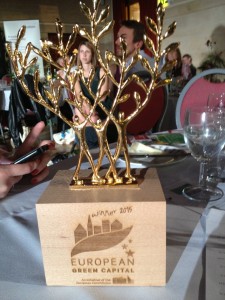Bristol will stage a programme of events based around the idea of the city as a ‘laboratory for change’ now it has become the European Green Capital 2015.
Building on Bristol’s long history of experimenting, innovating and learning, the city will showcase the results of innovations and experiments that have already succeeded here, and will host bold new experiments to find out how best to create sustai nable urban environments.
nable urban environments.
Residents will also be asked to come up with ideas for their own experiments and Bristol will reach out to other European cities to share the learning. The experiments will focus on the city’s five priority areas of transport, energy, the low carbon economy, improving local environments and places, and supporting local centres.
They ideas be tested live around the city over the year and ‘streamed’ over the internet so others can take part and the results can be shared.
In addition, some of the city’s biggest annual events will be turned into ‘green’ versions of themselves, attracting new visitors to Bristol and reinforcing its reputation as a leading sustainable city in the UK and Europe.
Mayor of Bristol George Ferguson said: “Bristol has launched its strongest bid yet. We aim to lead the way and inspire other cities around the globe. Winning the European Green Capital Award in June will help accelerate the progress Bristol has made to date and help us towards meeting our ambitious 2020 targets.”
Bristol has the highest cycling rate among Britain’s core cities (the eight largest city economies outside London), with nearly 50 per cent more people cycling to work now than they did in 2007. More than 16,000 people now cycle to work, which is more than Liverpool, Sheffield, Nottingham and Newcastle’s cyclists put together.
Residents in the city also produce less waste and recycle a higher percentage of goods than any of the other core cities, making it the least wasteful city in Britain.





























